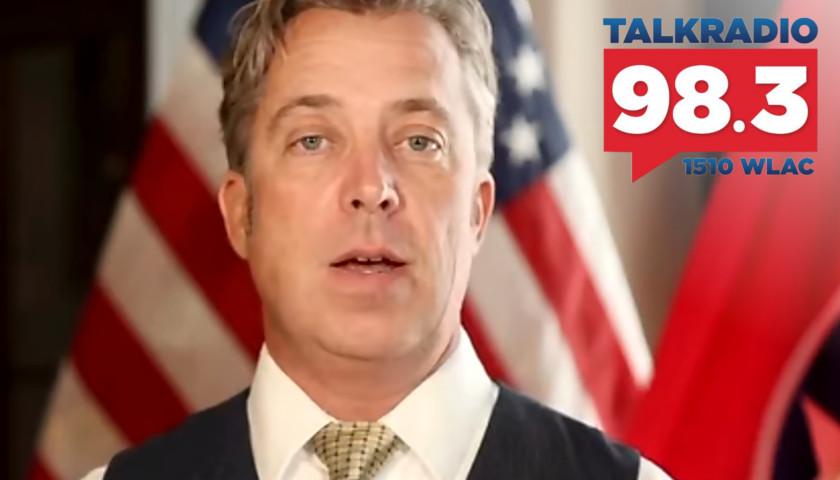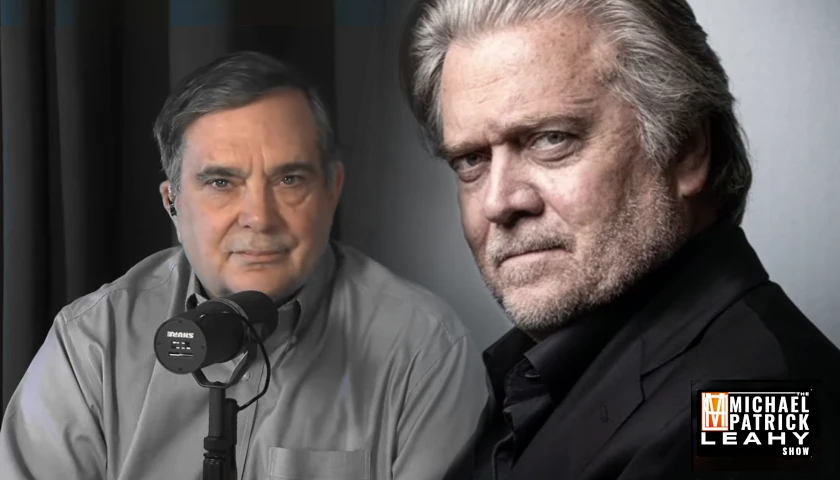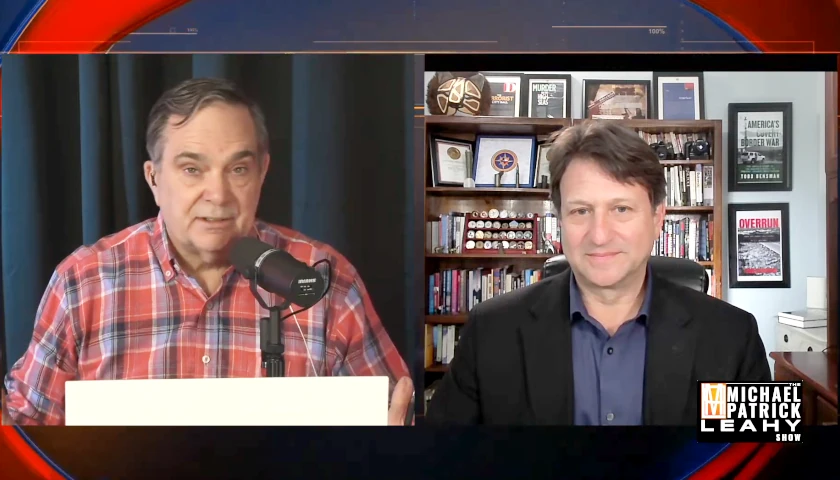One of the key figures in the center of the budget debate – Tennessee’s own Representative Andy Ogles (R-TN-05) – took a break from ongoing talks to join The Tennessee Star Report with Michael Patrick Leahy Friday to fill in listeners on where the House is on the budget, and what he sees coming in the days ahead.
TRANSCRIPT
Michael Patrick Leahy: 7:33 a.m. – in-studio, original All-Star panelist Crom Carmichael; on the newsmaker line right now, the man at the center of the controversies going on in Washington D.C. this very moment, our good friend, Congressman Andy Ogles, who represents the 5th District here in Tennessee.
Good morning, Congressman Ogles.
Andy Ogles: Good morning. How are you guys?
Michael Patrick Leahy: Well, my question to you, Andy, is this: two years ago, when you would be getting up at four o’clock in the morning and leaving your house in Columbia to come in here and spend the morning in-studio with us to talk about issues of the day, did you think that two years later, you would be the man at the center of the national budget controversy going on in Washington, D.C. today?
Andy Ogles: I don’t know that there’s any way you could have predicted, and quite frankly, I mean, if we had had a conversation about redistricting, I mean, I would have assumed that Maury County, you know, whether divided between the 4th and the 7th, the way it was, or maybe would be lumped into the 4th. That was the kind of your two logical options.
But to be 5th District was really not on my radar; I didn’t really have any intentions of running for Congress, and then redistricting happened, and the rest is history.
Now we have this budget fight, and we’re kind of on this wash, rinse, repeat cycle. I mean, the last time we passed budgets under regular order was 1997.
Michael Patrick Leahy: That is just crazy. And for our listeners, explain to them what “regular order” means when it comes to a budget.
Andy Ogles: Well, you know, not to get too wonky, but, you know, if you go back to January, we had the fight over the Speaker, for most of us, it had nothing to do with the Speaker. It was about the rules that go along with that Speakership.
And so what we agreed upon is there would be 12 appropriations bills, so when you’re passing the budget for the Department of Defense, you’re just talking about the Department of Defense.
When you’re passing the budget for education, you’re just talking about education, which makes sense, right? It’s kind of a single issue, very topic-driven budget.
But what that does is it sets a deadline for September 30th when the money runs out.
So we have this deadline, and here we are, eight days before the shutdown, and we still have two bills passed in committee.
We’ve only passed one on the full House – that’s MilCon [Military Construction]. And so this is one of those situations where I’m frustrated that leadership did not manage the clock.
Quite frankly, we shouldn’t have gone on August recess. Now, I was busy in the district and that means I would have had to have canceled lots of events – but I would have stayed up here all of August. But here we are, they’re running out the clock, they’re trying to jam a budget down our throats, and we’ve taken a stand and said, ‘Look, the American people expect us to do this in a responsible fashion,’ and that’s what we’re going to do.
Michael Patrick Leahy: So you’re part of the sort of the “conservative rebels,” if you will – the 20 or so that held out on the voting for the Speaker. And one of those fellows is Matt Gaetz, who is here in town. And we interviewed him exclusively on Saturday.
But now he has a proposal to take each of these 12 budget areas separately.
Speaker McCarthy wanted originally just to pass the CR – the continuing resolution – which puts them all together. But you guys said no, and these 12 votes are going to happen over the next, what – nine days or seven days? – until the budget runs out on September 30th.
Is that right? Do I have that right?
Andy Ogles: That’s correct. Now, I don’t know that we’ll get them all done, but the key is – one of the things that we’re debating over is kind of the top-line spending number. So what’s the max budget that we’re agreeing to? And so by passing these appropriations bills one by one, we can make sure, make certain, that on behalf of the American people that the promised cuts are actually made.
And so that’s what’s going on over the weekend.
Some of these bills are going to back to – it’s being done primarily in the Rules Committee with cardinals. “Cardinals” are those folks that are in charge of the various budget areas and looking for those specific cuts that have to be made so that we actually make our budget.
And so this is somewhat of a historic process that we’re going through because again, we haven’t done it since 1997. And so think about that for a minute – I mean, you’re talking about, you know, 20-plus years ago since this process has been done this way. This is what our founding fathers intended, folks.
You know you’re supposed to argue and debate in the House. John Quincy Adams loved the House of Representatives. It was the “Raucous Chamber.”
But we’re also supposed to get our work done. And so I’m frustrated that here we are, the 11th hour and a lot of members went home this weekend. I’m still in D.C.
I’ve had the privilege when we were negotiating – so Matt Gaetz, Chip Roy, Byron Donalds, myself, and you had some of the New York delegation and some of the other folks from the different factions of the Republican caucus – we all sat down in a room and started hashing out what this process would look like and how we would move forward.
And we really held strong, we, the conservatives, and took the CR – the continuing resolution – off the table and said, ‘Look, we have time. The clock hasn’t run out yet. We have a responsibility to get as much work done as we can.’
And if we run out of time, then we can have that conversation. But I’m not just going to throw up my hands and quit.
I’m going to keep pushing, keep fighting, and quite frankly, pass budgets the way we’re supposed to.
Michael Patrick Leahy: Crom Carmichael has a question for you, Andy.
Crom Carmichael: Congressman, now a bill passes in the House. You got 12 bills, I think – I mean 12 different pieces of legislation. Then they, then, does each one then go to the Senate? As its own bill?
Andy Ogles: That’s right. And so the Senate can use a funding mechanism and send back, you know, kind of like one spending bill. There’s some procedural things that they can do.
And look, we realize, we recognize that whatever we send to the Senate, they’re going to kick back – but I can’t control what the Senate does. I can’t control what the president of the United States does.
But what we have to do as Republicans, conservatives in the House of Representatives is keep the promises we’ve made, and that’s to start moving us towards a budget that cuts spending. And what we’re doing is we’re setting up the conversation that we’re going to have in 2024.
We’re setting up a conversation that we’ll have with the Senate because we will win the Senate.
The Republican map for the Senate looks very good. Obviously, the White House is a coin toss. But, you know, we’ve got to have these conversations – and part of it is muscle memory.
I mean, again, the House of Representatives hasn’t done this in a very long time, so we’re trying to retrain them on how to do the job of passing budgets.
Michael Patrick Leahy: Andy, you know, you have become very prominent nationally. Because of your steadfast opposition to this blind spending that would be in the Continuing Resolution. Look, I watched you on Bannon yesterday, a great performance there.
Also you said you’ve been talking with President Trump about this.
Tell us about that call.
Andy Ogles: I was actually with Matt Gaetz, and the president had called Matt, to be clear.
They’re having a conversation and he said, ‘Mr. President, just so you know our dear friend Andy Ogles is in the room,’ and he’s like, ‘Put him on the phone.’
And so I had a conversation and he appreciates the fact that we were sticking to our principles that we’re really trying to target the woke, woke and weaponized government, in particular, the Justice Department.
Look, you can agree or disagree with January 6th. You can have your own perception of that, but the due process that hasn’t taken place for some of these folks is in and of itself, criminal. Look at the way the president’s being targeted.
Again, you can like Trump, you can not like Trump – but when you have a Department of Justice, in particular, what district attorney is trying to use RICO charges to charge a former president because he didn’t agree with the election.
Keep in mind, Stacey Abrams didn’t agree with her election. She said she had won it.
I mean, you’ve had multiple people do similar things. And I don’t want to litigate that.
But what I’m saying is, we have a Justice Department that we know is now targeting Americans on behalf of this administration and that’s a very scary prospect if that becomes regular order; if that becomes the way the FBI does business.
But anyway, it was a good conversation. It’s a little bit surreal to be on the phone with a former president and he’s calling you by your first name and asking how the kids are doing that kind of stuff, but it is what it is.
And, you know, my intent was not to be nationally prominent. My intent was to come up here and do a job and try to do it well.
But sometimes, that means just sticking to your guns and not backing down.
Michael Patrick Leahy: Congressman, can we gaze into Andy Ogle’s crystal ball?
Let’s move the clock forward to 1159 p.m. this, a week from Saturday. What are we going to see? We’ve got a minute left before the funding runs out.
What will have happened by a week from Saturday?
Andy Ogles: What I expect to happen is we’ll pass most, not all, of the spending bills. There will be a short, a few day shutdown.
Now the good thing about this, the way the calendar works for, from a payroll perspective, is the federal employees, their payday happens on a holiday.
So it actually happens right before the shutdown, so they’ll get paid and won’t have to go without a pay. And so, to give you context of that, it is during a shutdown, some federal employees are sent home without pay. Now, when they come back, they’re made whole, but, you know, if you’re living paycheck to paycheck like many Americans that’s problematic.
And so from that perspective, that’s not it’s not it’s always a concern, but that doesn’t really become an issue.
But I expect we’ll be shut down for 2 or 3 – maybe 5 days, but it won’t be very long because we’re doing our work.
The rules committee is meeting today. They’re going to move forward a rule.
A rule is the first step – it’s a very procedural thing that has to happen before you can vote on a bill.
On Tuesday, we’re going to vote on three, maybe four pieces of legislation – four of those bills.
So suddenly, we’ll go from having only one pass to five passes and we’ll start grinding through the other ones. Because of the notice requirements, getting something out of committee and to the floor is about a five to seven day process, depending on the weekend and such.
So we’ve got a lot of work done. I’m again, I’m frustrated that we didn’t stay – like, we could have stayed one week in August and we could have gotten half of this done already, and then we’d be coasting to the end of the year.
But that being said, I do predict a shutdown. I do believe it will be short-lived.
But we will have done our job, and then whether or not the Senate funds securing the border.
That’ll be on them – that’ll be the conversation that goes forward: whether or not the Senate Democrats are willing to let our country continue to be invaded at a time when you have the mayor of New York crying for relief; you have Chicago crying for relief that we have to close the border.
Michael Patrick Leahy: Congressman Andy Ogles, thanks so much for taking some time out of your busy schedule to join us.
Of course, you’re always welcome here in-studio, and keep up the great work there.
Andy, thanks for joining us.
Andy Ogles: Thank you all. God bless.
Michael Patrick Leahy: All right, when we come back, it’ll be time for News Potpourri.
– – –
Tune in weekdays from 5:00 – 8:00 a.m. to The Tennessee Star Report with Michael Patrick Leahy on Talk Radio 98.3 FM WLAC 1510. Listen online at iHeart Radio or Spotify.
Photo “Andy Ogles” by Andy Ogles.




